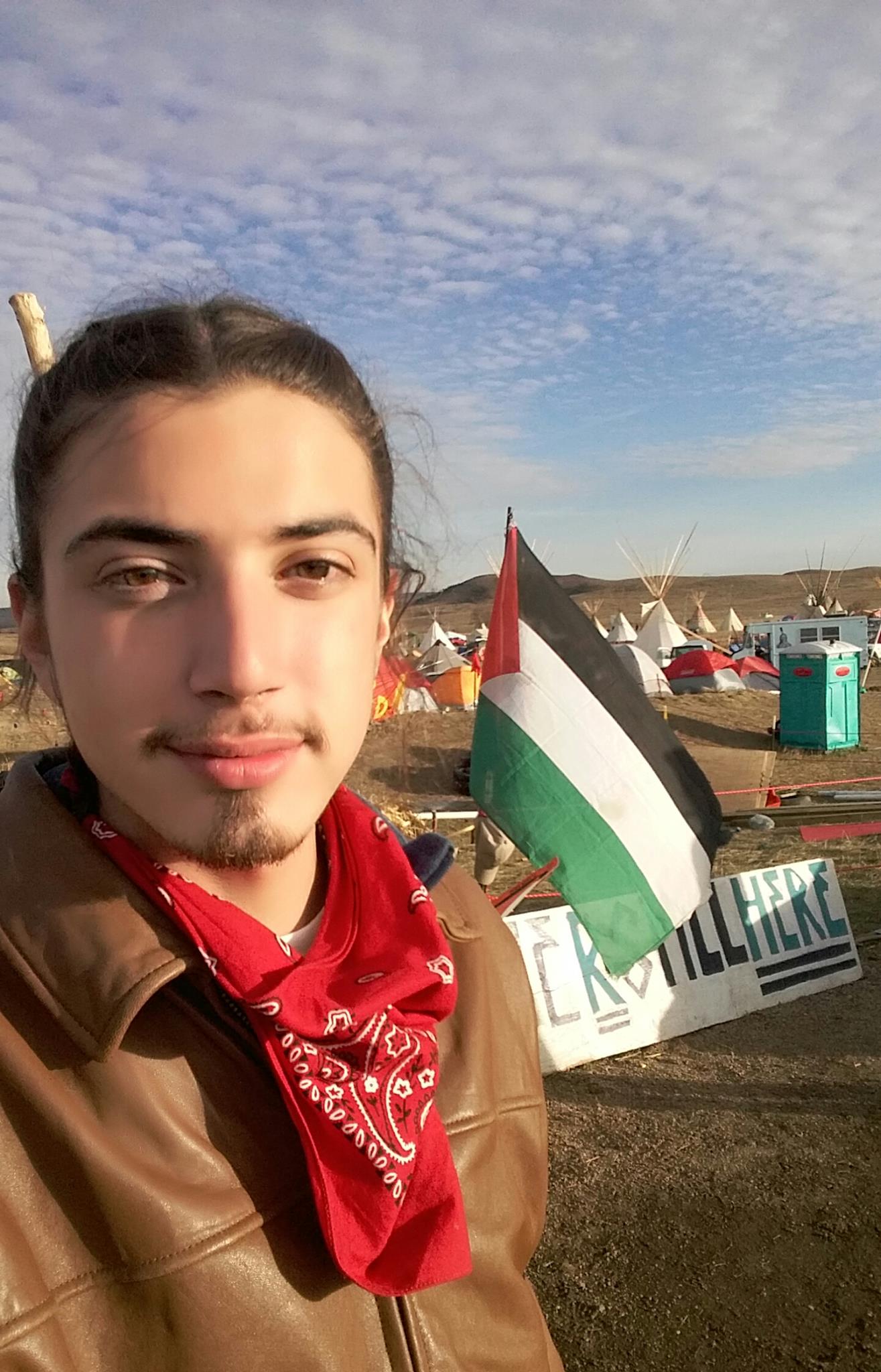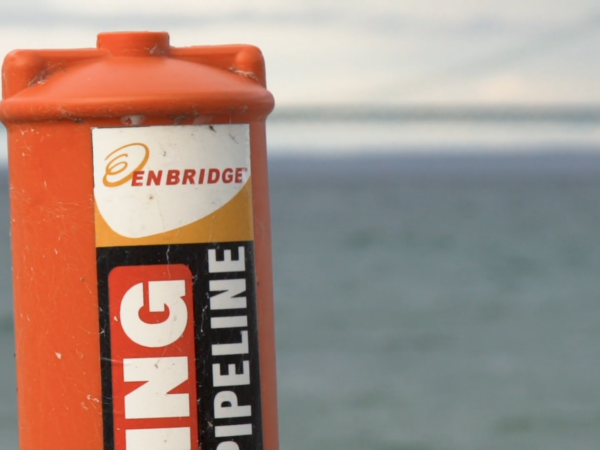
I first came across Trenton Joseph Casillas-Bakeberg in a live facebook feed posted by Myron Dewey of Digital Smoke Signals while researching first-hand accounts of situation in North Dakota. I was moved by his calm, thoughtful demeanor as he told the story of a traumatizing experience he had a week ago today, Oct. 27th as he was pulled forcefully out of a sweat lodge where he was in prayer, protesting the ongoing construction of the Dakota Access Pipeline. I was able to get in touch with him, and ask him about the events of that day, and how he was processing the experience. Trenton is twenty years old. He’s lived between Vermillion, South Dakota, and Cheyenne River Indian Reservation all his life. When I caught up with him, he was at his Aunt’s house, recovering from having been aggressively handled by police, held in jail overnight and charged with a federal crime, along with over a hundred other protestors. He’s been part of the movement to stop the construction of the pipeline since August of this year. An active member of the International Indigenous Youth Council, Trenton has spent most of his time in the youth camp that is on the Standing Rock Sioux Tribe Reservation. But on Oct. 27th, he was part of a camp that was outside of the relative safety of that camp, in a temporary camp set up directly on the Dakota Access construction path between the active construction machines and the Missouri River. Trenton was engaged in a prayer circle, as bulldozers and law enforcement approached. He felt a tap on his shoulder from a man who invited him to take part in a sweat lodge- a spiritual ceremony in a tent like structure that involves pouring water over hot stones and praying- and he joined him. Not long after the ceremony started, the tarp was ripped away by law enforcement officials, and Trenton was pulled out of the sweat lodge in only his boxers. His hands were zip tied behind his back, and he was pushed on to a bus without his clothes. He watched as others were beaten by batons, maced, and handled violently as machinery tore up land that was sacred to them. At the jail, he was given a number, which was written on his arm, and corralled into dog kennel like holding pens. The zip ties were so tight that when they were removed by officers, he got a gash on his wrist. Here Trenton describes the experience in his own words:
“On October 27… a few of my friends were maced multiple times in the face … at least three to five times by different officers. You know just trying to keep pushing them back on the front line because they were pushing everyone out of the camp and they succeeded with that eventually after a couple hours… pushing them back and macing them and arresting whoever wouldn’t move on. Actually my my good friend… she had her wrist broken by a police officer last Saturday. And she was beaten with the baton trying to protect a kid because the kid was so scared and terrified that the officers were corralling the protesters into a circle… She tried to protect the kid and the officer beat her arm till her wrist broke. And then on … this past mass arrest she was part of it an officer actually grabbed her wrist and turned it and re-broke it.”
In his telling of the event, the emotion in his voice is palpable. He’s trying to understand the motivations and the emotions of the people confronting his friends.
“You know some of those officers, you can see it in their eyes you know some of them are good people they just don’t like what they’re doing… other ones… they’ve been completely brainwashed into this evil robot like creature … when I was arrested I was trying to the talk to the officer who is who is cuffing me … but he wouldn’t even look at me or say anything to me. I asked him what his name was I asked him where I was going, I asked him if he could get my clothes, because I was still in my boxers and he didn’t even let me get my clothes and I got no response so … I felt like it was a completely inhumane situation…”
Trenton seems confused by how all of the people working on behalf on the pipeline could be so unmoved by what is clearly in the best interest of all people. In Trenton’s eyes, he’s working to protect the well being of future generations of all people. But, more distressing to him than the lack of emotion or empathy that the officers showed, are the ways in which he feels people’s rights are being violated.
“When I was in jail…with a journalist from Texas who was living in New York … he said that he was on the front line when he was arrested and one of his journalist friends said to him … “this is the craziest shit I’ve ever seen and I’ve covered Afghanistan … I don’t even think some of this stuff is legal.” And right after that… he saw an officer with a big can of gas or mace or something, getting ready to use it and so he walked up to the officer and held his microphone up to him he said “Sir are you really about this gas on these unarmed protester?” And without answering the question the officer said I’m going to arrest you and grabbed him and threw him to the ground and took his camera in and just arrested him like that… it was just a very hectic day. And they have they have rules you know laws that they should be following but they don’t play by them at all. I’m getting kind of emotional talking about it but it’s the reality of the situation at this moment. And I know everyone experienced it in a different way and in my experience personally was significant because just another man and I were in a sweat lodge and we were ripped out of that we had our religious rights violated regardless of the alleged criminal trespass that we were charged with. Still you know that’s a sacred ceremony and they said that they were going to give us enough time to finish but they didn’t. And that’s not right… according to the American Indian religious freedom act of 1978 that’s a federal crime…..we saw that raping of Mother Earth… and they were taking people’s staffs and Chanupas from them… desecrating these sacred things all on one day. It was honestly one of the craziest days of my life. And I’ll never forget it. “
Throughout the conversation, Trenton thanks me for my interest in his experience. He is gracious and forthcoming, and happy to clarify any details that I might be fuzzy on. I’m impressed by his poise, and the way in which he is searching, in every breath, to move beyond the hurt and trauma of the situation for which anger seems like a natural response, to get back to the main message: land and water are sacred, and we have to protect them, not just for ourselves, but for generations to come. In this moment, he implores, we have the chance to rewrite history, and move in a more positive direction for the planet, and all people.
“I’m still trying to process how I can approach this in a graceful manner and I don’t want to offend anyone… orget the government after me for speaking truth about this but…they really did mess up that day by desecrating all that sacred ground… I think the ultimate best outcome would be to change the paradigm that the people in power have. You know, open their minds and their hearts to the truth. To know what it means to be connected to the earth and what it means to be connected with each other… so that they can feel empathy for the people who will have to suffer through sickness and disease if they have to drink polluted water because right now there is no connection… the ultimate goal, in my opinion, would be to change their minds and to help them… I pray for them that they can learn to be in a better place and do better things and reinvest their money into renewable energy and into all around better investments that won’t harm people…on a on a deep level it’s about re-establishing our connection with the earth as a whole and evolving our consciousness to move forward in a better and more holistic way and taking into account our actions. What we do unto the earth and do unto others comes back on us and with what we’re experiencing now is of a reflection of everything that’s happened in the past … it’s history is repeating itself again. And I just hope this time we can rewrite it in a better way.”
At the time this blog is being posted, construction is continuing, just on the edge of the Missouri River. The Army Corps of Engineers have not given permission to Energy Transfer, the parent corporation for the Dakota Access Pipeline, to continue construction of the line under the river. President Obama recently stated in an interview that the Army Corps is looking for an alternative route to the pipeline. Meanwhile, clashes between protestors and law enforcement continue. Tensions run high as protestors continue to try to block the construction. Reports of aggressive tactics by law enforcement, including close range firing of rubber bullets, are being shared on social media. We’ll be checking in with Trenton to see how he’s doing this week- and hear more of his perspective. We’ll also be trying to get a perspective from the other side of the conflict- where supporters feel equally passionate about the importance of the pipeline for the economic stability of their region, and American energy independence.
In the meantime, here are some resources for learning more about the issue:
A recent article from The Guardian
CNN Dakota Access Pipeline Explainer
A thorough overview from Smithsonian Magazine
Informational website from the parent company building the pipeline
Informational website for the Sacred Stone Camp





